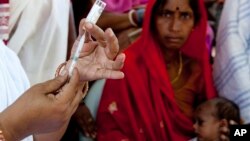The World Health Organization warns millions of children are at risk of illness, disability and death because they are not getting vaccinated against preventable, killer diseases. In advance of World Immunization Week, the U.N. agency is urging nations to increase efforts to keep their children healthy by getting them.
The World Health Organization warns progress toward the U.N.'s goal of 90 percent global vaccination coverage is stalling. It says one in five children worldwide is missing out on routine life-saving immunization.
Data for 2013 show nearly 22 million infants missed getting their required three doses of diphtheria and tetanus-pertussis vaccines. Many of these children are living in the world’s poorest countries.
WHO Director of Immunization, Vaccines and Biologicals Jean-Marie Okwo-Bele says the plateau in vaccination rates carries terrible consequences. He says about 1.5 million children are dying prematurely from preventable diseases each year.
He says one way to remedy this is by integrating immunization with other health services.
“We have data that show that up to 40 percent of children who are seen at health clinics for various reasons would go out without being checked for their vaccination status, without being vaccinated when they should have been vaccinated. So, correcting this, what we call missed opportunities for vaccination, is for us a key action to improve immunization.
WHO says reasons for low vaccination coverage include lack of access to health services, insufficient number of health care workers, inadequate supply of vaccines, and insecurity.
The U.N. agency says 35 countries have an immunization coverage rate below 80 percent. The majority of them are in just six countries — India, Pakistan, Nigeria, the Democratic Republic of Congo, Ethiopia, and Afghanistan.
Dr. Okwo-Bele tells VOA that officials in these countries know they have to do better and are making efforts to improve immunization.
“I mentioned India, truly using the asset that they have that have driven the polio eradication program and now in support of routine immunization," he said. "So we may have already seen some improvements, but the data for 2014 has yet to come in. Pakistan, I said it, we were already there, fantastic in terms of planning today in what they are doing. In Nigeria, we have evidence that coverage has improved.”
WHO estimates immunizations prevent between two and three million deaths annually and protect many more people from illness and disability. It notes there are new life-saving vaccines against diarrhea and pneumonia, and reports the development of vaccines to protect adolescents and adults against influenza, meningitis and cervical and liver cancers.
Health officials urge nations to build upon these successes and not to become lulled into a sense of false security. They also note that measles and other diseases are spreading in the United States, Canada and Europe because some parents have stopped immunizing their children.




